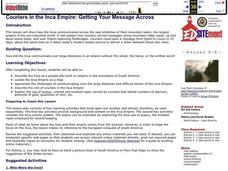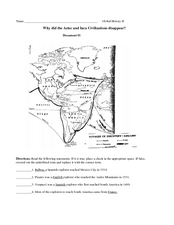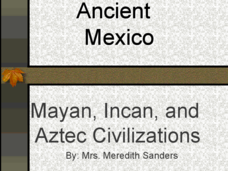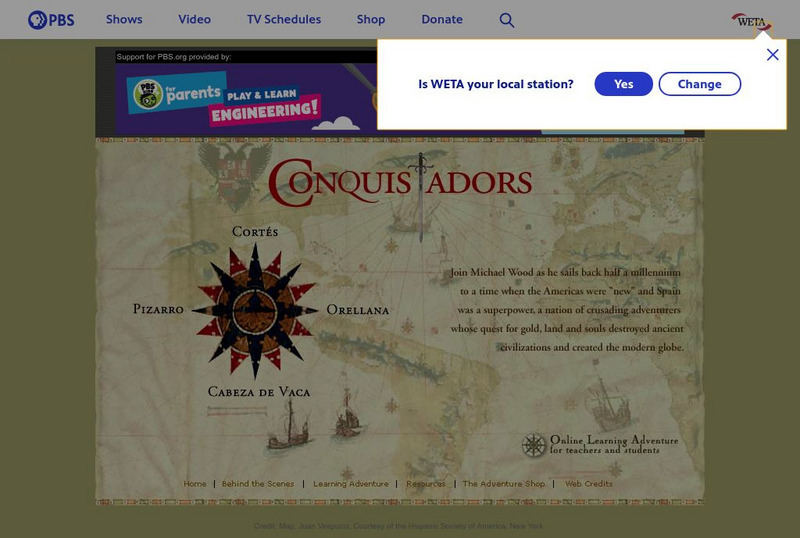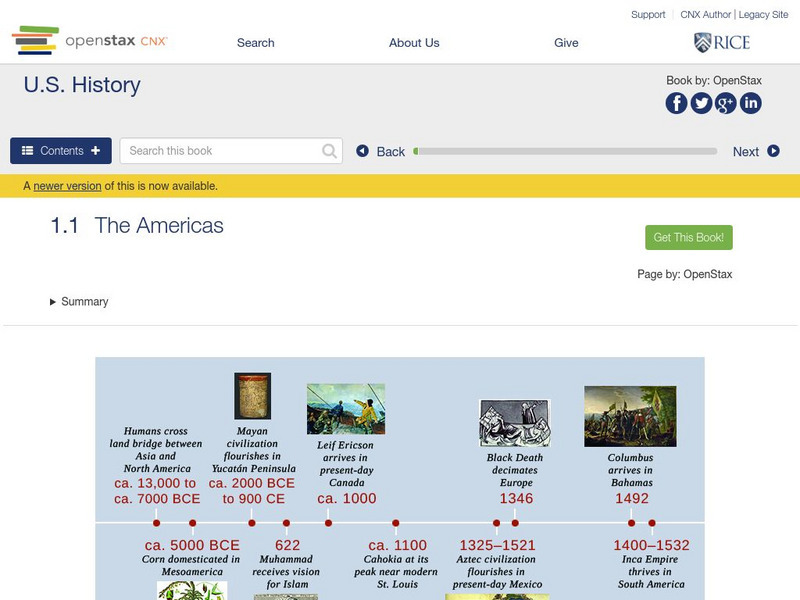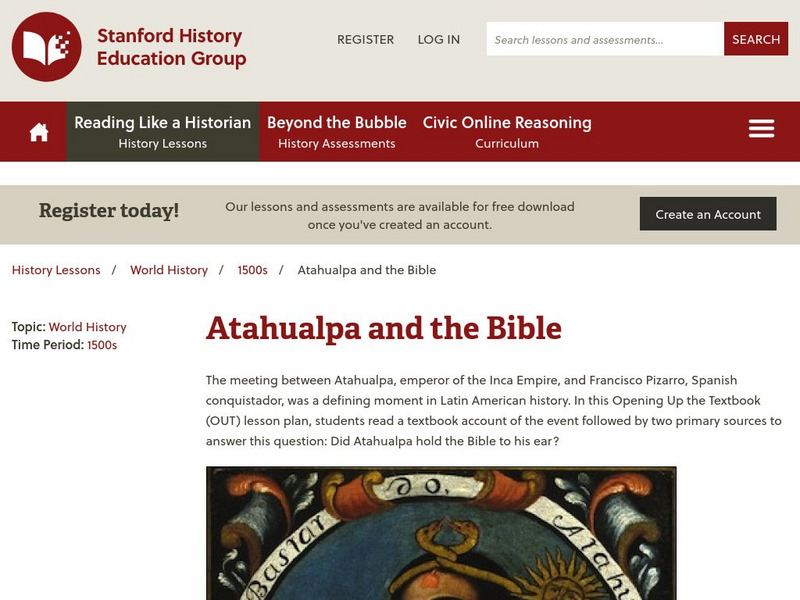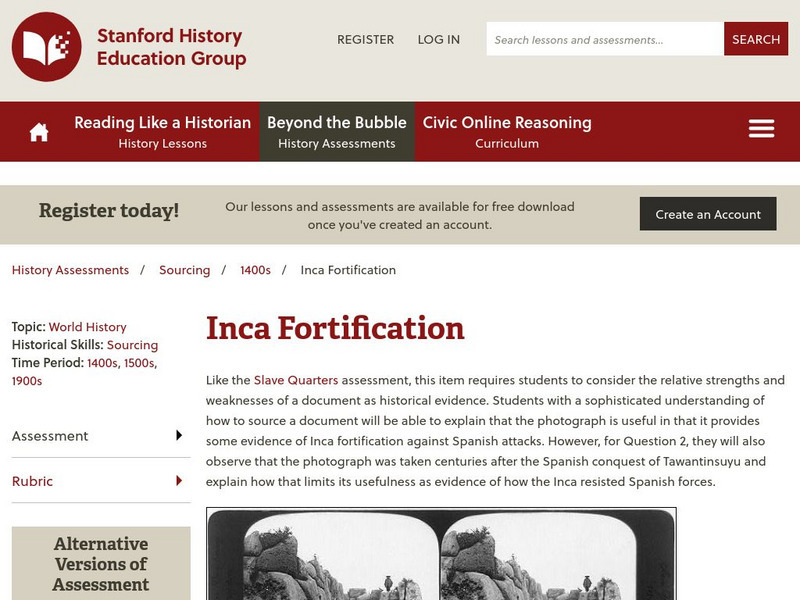Core Knowledge Foundation
Maya, Aztec, and Inca Civilizations
Here are a series of lessons on the Mayan, Aztec, and Incan civilizations. This incredible, 15-lesson unit would be perfect for any fifth grade study on these important civilizations. Learners focus on the complex nature of the cultures,...
Curated OER
Lesson: Creative Containers
Even functional everyday objects can be highly ornate and thoughtfully designed. Art analysts look at the form and function of an Inca jug used to transport liquid. They consider this jug in relation to other jugs fashioned throughout...
Curated OER
Couriers in the Inca Empire: Getting Your Message Across
Students examine how the Inca communicated over large distances. They locate the Inca Empire on a map, define key vocabulary terms, play the game, 'telephone,' and create a quipu to show the year they were born.
Curated OER
Spanish Conquistadors
A Conquistador is a Spanish name derived from the Reconquista, a period of reclaiming land from the Muslims. However, it became a call of conquest! Here are 17 slides that depict key conflicts between the Spanish and Native Mexican...
Curated OER
Why did the Aztec and Inca civilizations disappear?
Middle schoolers can analyze primary source documents to answer the question, "Why did the Aztec and Inca civilizations disappear?" They will read the provided excerpts then answer 11 different questions to uncover the ultimate answer.
Curated OER
The Inca Empire: Fact of Opinion
Supplement a lesson on the Inca with this worksheet. Highlighted are 2 image documents which are analyzed to answer 5 fact or opinion questions. Pupils need to provide examples and evidence to support their answers.
Curated OER
Ancient Mexico: Mayan, Incan, and Aztec Civilizations
A basic overview of the early civilizations of Central America, this slideshow would be a good foundation for a lesson on the characteristics of these three tribes. It would fold into a unit on world cultures or European exploration...
Curated OER
Maya, Inca and Aztec
Students work together in groups to research either the Maya, Aztec or Incas. They discover their art and examine their daily life. They develop a quiz to give to their classmates over the information they shared.
Curated OER
The Inca: A Lost Society
In this ESL social studies worksheet, students collaborate with classmates to discuss and complete 5 pages of activities pertaining to the ancient civilization of the Incas.
Curated OER
Worksheet #9 Questions - Inca Civilization
In this Inca civilization worksheet, students find the correct answer to the ten fill in the blank questions about the Inca civilization.
Curated OER
Ancient Cities
Students discuss ways homes, buildings and cities are designed for a particular climate and geography. Students use a chart and conduct library and online research to explore ways the Mayans and Incas developed their land based on their...
Curated OER
Art of the Inca
Students examine the early civilizations of Central and South America. After examining hand-crafted objects, they discuss the craftsmanship of the Inca and how they used geometric shapes and symbols in their art. They draft a design...
Curated OER
Couriers in the Inca Empire: Getting Your Message Across
Students explore how the Inca communicated across the bast stretches of their mountain realm.
Curated OER
Advanced Native American Civilizations
For this advanced Native American civilizations worksheet, students examine the location, facts, and pictures of the Mayans, the Incas, and the Aztecs on the graphic organizer.
Curated OER
The Inca Civilization Puzzle
For this Incan civilization word puzzle worksheet, students complete a crossword puzzle using their knowledge of Incan culture. Clues cover information on geography, industry, government, and fauna.
Curated OER
Central And South America And Their Ancient Civilizations
Fifth graders listen to lectures on the ancient civilizations of the Aztecs, Incas and Mayans. They construct a mask base and then decorate it in thirds with symbols meaningful to each of the three cultures being studied.
PBS
Pbs: The Conquistadors
A huge website that provides a virtual field trip exploring the Spanish adventurers who quested for gold and land in the New World. The site has information on Pizarro, Orellana, Cabeza de Vaca, Cortes as well as extensive information...
Other
Peru Cultural: The Incas
An award winning site that uncovers the lost Incan civilization. Features include history, administration, technology, arts, and maps. A sophisticated account of the Incas that is well worth a visit.
Other
Machu Picchu Travel Guide: Machu Picchu History
An extensive history of Machu Picchu beginning with the construction up to the discovery by Hiram Bingham. There is an entire page devoted to the cultural pillaging of Machu Picchu that is very interesting.
OpenStax
Open Stax: The Americas
After reading this section, students will be able to locate on a map the major American civilizations before the arrival of the Spanish, discuss the cultural achievements of these civilizations and also the differences and similarities...
Stanford University
Stanford History Education Group: Atahualpa and the Bible
[Free Registration/Login Required] Lesson in which students explore and examine primary source material to answer a question about Incan Emperor, Atahualpa's meeting with Spanish conquistador, Pizarro. Includes downloadable lesson plan,...
Stanford University
Beyond the Bubble: Inca Fortification
[Free Registration/Login Required] Assessment in which students examine a significant photo taken in Cuzco, Peru, in 1907, and answer the questions provided.
BBC
Bbc Newsround: Ancient Inca Roads Given World Heritage Status
UNESCO selects important historical locations for preservation. Learn why roads from the Inca culture are now a World Heritage site.
National Endowment for the Humanities
Neh: Edsit Ement: Couriers in the Inca Empire
Students will discover who the Inca were, where they lived, and how they communicated across the vast stretches of their mountain realm, the largest empire of the pre-industrial world through a variety of activities.




